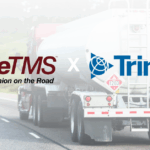Liquid haulers can surge forward with modern dispatch software.
Liquid bulk transporters have unique challenges that can be solved with innovative and economical technologies. This article explores the benefits fleets can expect from using an advanced, cloud-based dispatch and transportation management system.
1. Ensure Safe & Accurate Delivery of Loads
Safety is an ever-present concern in tanker trucking due to the added risks of transporting bulk liquids susceptible to hazardous leaks, spills, and accidents. For example, when making deliveries, drivers can have “cross-drops” where the product goes into the wrong storage tank. A study found that fuel haulers unintentionally mix diesel and gasoline deliveries once every 45,000 shipments and mix gasoline octane types once every 14,000!
The percentage of cross-drop deliveries is low, but the price is enormous for fuel haulers and their customers. Revenue is lost whenever fuel pumps are shut down to be cleaned and refilled. Meanwhile, the tanker fleet must pay thousands to pump out contaminated fuel, drive to a recycling center, dump it, refill the correct gasoline, and redeliver it.
Advanced dispatch and transportation management software can mitigate these risks. A new solution offers interactive trailer diagrams for dispatchers to optimally match assets with customer orders, ensuring tankers have the suitable capacity and the necessary equipment for each job. A new also TMS platform makes creating custom workflows for drivers easier. Fleets can give drivers step-by-step guidance and real-time communications that provide checks and balances and visibility to ensure drivers pick up and deliver the correct loads to the proper tanks.
2. Stay Compliant with Evolving Regulations
Managing the surplus of ever-changing regulations for liquid bulk shipments can be simplified using advanced dispatch software with customization, integration, and document management capabilities.
Liquid bulk transport carriers can use a TMS platform to manage driver qualifications such as verifying/storing licenses, certifications, and compliance certificates. Documents can be uploaded and stored for quick and easy access from anywhere.
The software can generate driver reports to keep track of expiring qualifications, assigned and completed training, and driving infractions like accidents or violations. The advanced software’s integration and document management features help liquid transport companies adapt quickly to regulatory changes to comply with local, national, and international regulations to avoid legal and environmental risks.
3. Meet Customer Needs
Efficient order processing, clear communication, and shipment visibility are instrumental in meeting customer needs in the tanker trucking industry.
As one of the industry’s largest segments, fuel haulers or “jobbers” can use dedicated web portals in a next-gen TMS platform that give customers an electronic order entry process and provide transparency from initial tender to final delivery.
The customer portals streamline order fulfillment, reduce billing cycle times, and prevent miscommunication and order disputes. Customers can access real-time tracking and ETAs to prepare for deliveries.
Additionally, a platform with an integrated mobile driver app facilitates detailed load instructions and proof-of-delivery receipts, enhancing communication between tanker trucking companies and their drivers. This ensures drivers follow customer directives accurately, improving the customer experience.
4. Increase Operational Efficiency
Ratcheting up on efficiency is a recurring need for tanker trucking companies. Dynamic dispatch software that identifies cost-effective routing options based on pricing, inventory data, and other decision variables can address this omnipresent challenge to help tanker trucking companies reduce wasted time and fuel.
Fleets can also use the software platform to automate the flow of data and documents for accounting, compliance, and other tasks to gain an edge in operational efficiency and accelerate cash flow.
5. Integrate Systems & Streamline Data
The tanker trucking industry often faces challenges with connecting systems. This creates duplicative and repetitive tasks that sap productivity and waste time and talent resources.
To address this challenge, dispatch and TMS software that integrates seamlessly with existing tech stacks can provide a centralized platform that connects with internal and external systems for greater supply chain visibility, automation, and control.
By integrating with various systems, the core functions of the TMS platform are bolstered by data that improves the quantity and quality of dispatch, accounting, routing, load visibility, and other processes. As a result, fleets can identify discrepancies and errors in orders and optimize the use of assets and resources to reach higher levels of efficiency.
Choosing the Best Fuel Delivery Software System for Your Fleet
All the challenges outlined above and more can be addressed with modern technology that doesn’t break the bank. Choosing the best dispatch and TMS system to plan and execute on-time and error-free deliveries is paramount for fuel haulers and other tanker trucking companies.
Tanker fleets should opt for systems that prioritize safety and have unique features that can prevent cross-contamination. They should also choose software that offers customization, integration, and document management capabilities to comply with evolving regulations. Also, managing driver qualifications, tracking certifications, and generating compliance reports is crucial for managing risk.
In addition, bulk liquid haulers should look for a platform with electronic order entry, real-time tracking, and improved communication through integrated mobile driver apps that enhance the overall customer experience. And, the fuel dispatch software should be able to identify cost-effective routing options and seamlessly integrate with other systems, providing a centralized platform for supply chain data to improve data management and decision-making.
Tanker fleets have a new road forward with TrueLiquid, an all-new transportation management system (TMS) tailored to their unique needs, simplifying the complexities of liquid shipping with innovative features that include interactive trailer diagrams, proactive load planning, real-time ELD integrations, and customer portals.
If you’re ready to transform your tanker fleet operations and experience the benefits of cutting-edge technology, contact the TrueTMS team today!
Sources cited:
2021 Civacon case study of R.B. Stewart Inc.’s use of the CivaCommand Smart Tank System.



